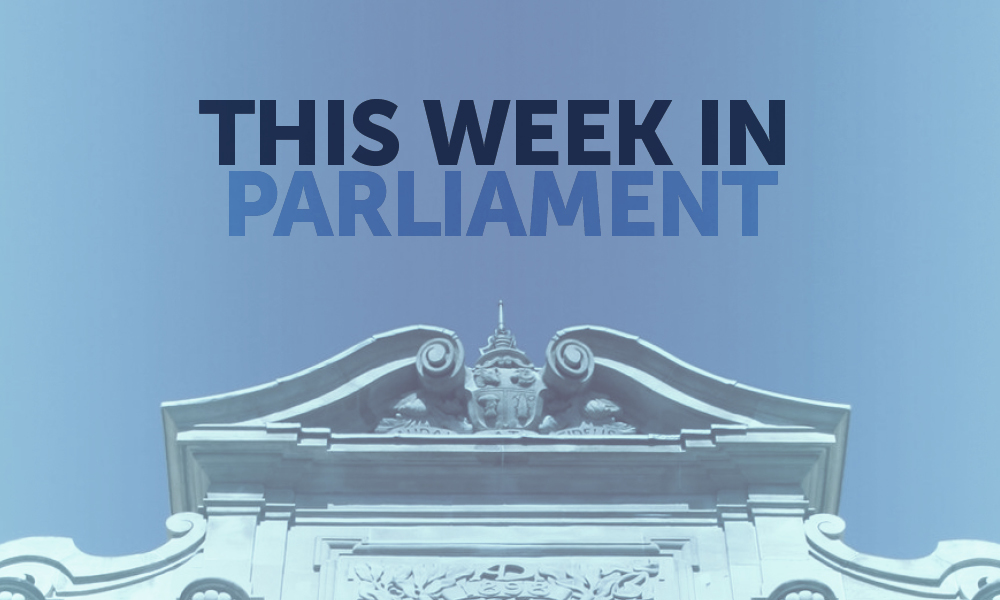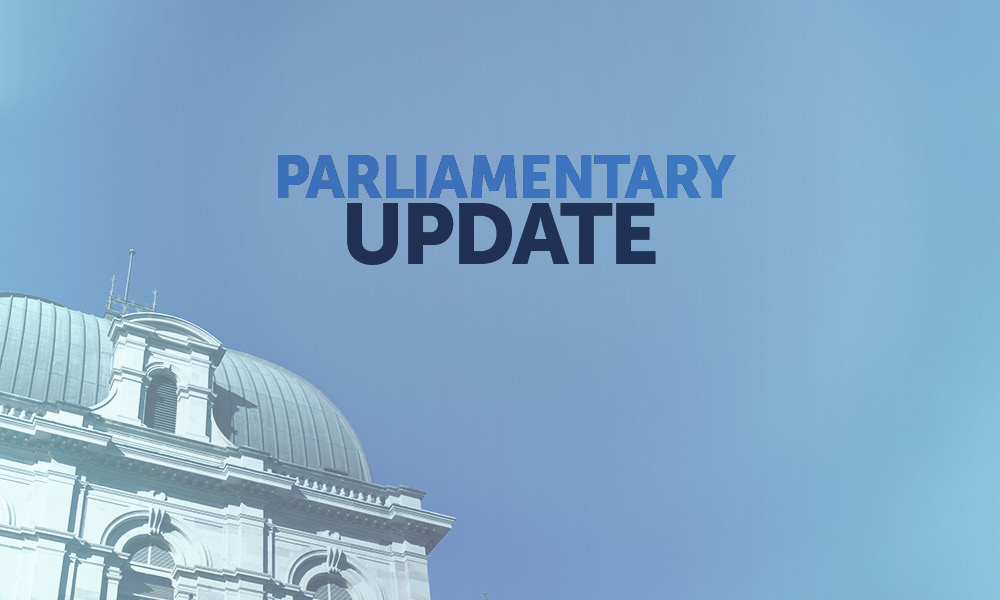Bills introduced:
The following Bill was introduced into the Legislative Assembly:
- Liquor (Artisan Liquor) Amendment Bill 2020
Liquor (Artisan Liquor) Amendment Bill 2020
The Liquor (Artisan Liquor) Amendment Bill 2020 was introduced by Glenn Butcher MP, Minister for Regional Development and Manufacturing on 9 September 2020.
The Bill has been referred to the State Development, Tourism, Innovation and Manufacturing Committee for inquiry. More information on the committee inquiry is available here.
The Bill seeks to amend the Liquor Act 1992 to support and regulate the emerging craft beer and artisan spirits industries.
As outlined in the explanatory note, the objectives of the Bill are to:
- create a new liquor license category for legitimate craft brewers and artisanal distillers
- expand existing capabilities for selling artisanal products at promotional events. and
- encourage the transition of existing licensees to the new artisan producer license category.
Read the Bill in full, here. See the explanatory notes, here.
Legislation passed this Parliament
The following Bills were passed by the Legislative Assembly
- Meriba Omasker Kaziw Kazipa (Torres Strait Islander Child Rearing Practice) Bill 2020
- Criminal Code (Child Sexual Offence Reform) and Other Legislation Amendment Bill 2019
- Criminal Code and Other Legislation (Wage Theft) Amendment Bill 2020
- Public Service and Other Legislation Amendment Bill 2020
- Appropriation (Parliament) Bill 2020
- Appropriation Bill 2020
Meriba Omasker Kaziw Kazipa (Torres Strait Islander Child Rearing Practice) Bill 2020
The Meriba Omasker Kaziw Kazipa (Torres Strait Islander Child Rearing Practice) Bill 2020 was introduced into the Legislative Assembly on 16 July 2020 by Cynthia Lui MP and was passed, with amendment, on 8 September 2020.
The Bill creates a framework to give legal effect to Ailan Kastom child-rearing practice and amends the Adoption Act 2009, Births Deaths and Marriages Registration Act 2003, Criminal Code, Domestic and Family Violence Prevention Act 2012, Domicile Act 1981, Evidence Act 1977, Guardianship and Administration Act 2000, Industrial Relations Act 2016, Integrity Act 2009, Payroll Tax Act 1971, Powers of Attorney Act 1998, Public Service Act 2008 and Right to Information Act 2009.
As outlined in the explanatory notes, seeking legal recognition under the framework is optional, based on three key criteria:
- consent of the birth parents and cultural parents for legal recognition
- suitability of cultural parents in that the practice as occurred has been verified by persons with knowledge and understanding of the practice specific to the family’s community, and
- a decision for a cultural recognition order must be made for the wellbeing and best interests of the child.
The Bill was passed with amendments to remove the words ‘time immemorial’ to the Preamble, in Clause 36, to make reference to the period the child has lived with the cultural parent, instead of the period the child lives at the address and in Clause 45, to ensure that a criminal history report is destroyed as a soon as practicable after it is no longer needed for the purpose for which it was requested.
Read the Bill as introduced, here. See the explanatory notes, here. See the amendments to the Bill, here. See the explanatory notes to the amendments, here. See the QLS submission on the Bill as introduced here.
Criminal Code (Child Sexual Offence Reform) and Other Legislation Amendment Bill 2019
The Criminal Code (Child Sexual Offence Reform) and Other Legislation Amendment Bill 2019 was introduced into the Legislative Assembly on 27 November 2019 by Yvette D’Ath MP, Attorney-General and Minister for Justice, and was passed without amendment on 8 September 2020.
The Bill amends the Child Protection (Offender Reporting and Offender Prohibition Order) Act 2004, Childrens Court Act 1992, Corrective Services Act 2006, Criminal Code, Criminal Law (Sexual Offences) Act 1978, Disability Services Act 2006, Evidence Act 1977, Justices Act 1886, Oaths Act 1867, Penalties and Sentences Act 1992, Police Powers and Responsibilities Act 2000, Transport Operations (Passenger Transport) Act 1994, Working with Children (Risk Management and Screening) Act 2000 and Youth Justice Act 1992.
As outlined in the explanatory notes, the objective of the Bill is to improve the responsiveness of the criminal justice system to child sexual offending and the victims of child sexual offences by amending a range of legislation to:
- implement recommendations of the Criminal Justice Report of the Royal Commission into Institutional Responses to Child Sexual Abuse
- implement recommendations of the Queensland Sentencing Advisory Council report on the classification of child exploitation material for sentencing purposes (CEM report); and
- create new offences criminalising the possession, production and supply of anatomically correct, life-like child replicas used for sexual gratification and some other minor and technical amendments.
Read the Bill as introduced, here. See the explanatory notes, here. See the QLS submission on the Bill as introduced, here.
Criminal Code and Other Legislation (Wage Theft) Amendment Bill 2020
The Criminal Code and Other Legislation (Wage Theft) Amendment Bill 2020 was introduced into the Legislative Assembly on 15 July 2020 by Grace Grace MP, Minister for Education and Minister for Industrial Relations, and was passed with amendment on 9 September 2020.
The Bill amends the Criminal Code, Industrial Relations Act 2016, Magistrates Court Act 1921 and the Queensland Civil and Administrative Tribunal Act 2009.
As outlined in the explanatory notes, the Bill gives effect to recommendations 8 and 15 proposed in the Education, Employment and Small Business Committee’s Inquiry into wage theft in Queensland. The committee found that wage theft across Queensland, was costing 437,000 workers and costing them $1.22 billion in wages and $1.12 billion in unpaid superannuation each year. The Bill intends to achieve its policy objectives by:
- enabling the prosecution of wage theft as stealing under the Criminal Code
- increasing the maximum penalties in the Criminal Code for the offences of stealing and fraud relating to wage theft
- facilitating the Industrial Magistrates Court’s jurisdiction for wage theft recovery matters, including the small claims wage recovery procedure of not more than $20,000 under section 548 of the Fair Work Act 2009 (Cth).
The Bill was passed with amendments inserting a new division into the Industrial Relations Act 2016,providing for the sharing of information by an employer to a registered employee organisation which has been authorised by the employee.
The Bill was not amended to make the new conciliation process outlined in the amendments mandatory, despite the Education, Employment and Small Business Committee’s recommendation following submissions, including from QLS, that it should be.
Read the Bill as introduced, here. See the explanatory notes, here. See the amendments to the Bill, here. See the explanatory notes to the amendments, here. See the QLS submission on the Bill as introduced, here. See the committee report, here.
Public Service and Other Legislation Amendment Bill 2020
The Public Service and Other Legislation Amendment Bill 2020 was introduced into the Legislative Assembly on 16 July 2020 by Annastacia Palaszczuk MP, Premier and Minister for Trade, and was passed with amendment on 9 September 2020.
The Bill amends the Industrial Relations Act 2016, Public Interest Disclosure Act 2010 and the Public Service Act 2008.
As outlined in the explanatory notes, the purpose of these amendments is to progress the priority stage one reforms recommended by the independent review of public sector employment laws. These reforms are intended to:
- drive more effective and consistent application of the existing commitment to maximise employment security by providing clear language that states that permanent employment is the default basis for public sector employment and that other non-permanent forms of employment should only be used when ongoing employment is not viable or appropriate
- provide for public service appeals which are currently heard under the Public Service Act 2008 (Qld) (PS Act) by the Queensland Industrial Relations Commission to instead be heard under the Industrial Relations Act 2016 (Qld) to ensure transparency and increase consistency in appeal decisions
- establish positive performance management principles in the PS Act that will support managers and employees to work together to support optimal performance
- clarify the threshold for taking disciplinary action, and
- provide for new directives to guide disciplinary action and procedures, investigations and positive performance management.
The Bill was subject to minor technical amendments which were intended to provide for effective implementation of the legislation.
Read the Bill as introduced, here. See the explanatory notes, here. See the amendments to the Bill, here. See the explanatory notes to the amendments, here. See the QLS submission on the Bill as introduced, here.
Appropriation (Parliament) Bill 2020
The Appropriation (Parliament) Act Bill 2020 was introduced by urable Cameron Dick MP, Treasurer, Minister for Infrastructure and Planning, on 8 September 2020 and was passed without amendment on 10 September 2020.
The Bill provides for supplementary appropriation for the Legislative Assembly and Parliamentary Service for unforeseen expenditure that occurred in the 2019-2020 financial year. As outlined in the explanatory notes, the Bill also provides for additional Interim Supply for the 2021 financial year. This is due to the postponement of Annual Appropriation Bills for 2001-21 alongside the postponement of the 2020-21 Budget.
Read the Bill in full, here. See the explanatory notes, here.
Appropriation Bill 2020
The Appropriation Bill 2020 was introduced by Cameron Dick MP, Treasurer, Minister for Infrastructure and Planning, on 8 September 2020 and was passed without amendment on 10 September 2020.
The Bill provides for supplementary appropriation for unforeseen expenditure that occurred in the 2019-20 financial year. As outlined in the explanatory notes, the Bill also appropriates additional interim supply for 2020-21. Ensuring the total amount of interim supply for 2020-21 is sufficient for agencies to continue ordinary operations of government until the Appropriation Bill for 2020-21 receives assent.
Read the Bill in full, here. See the explanatory notes, here.
Subordinate legislation
Subordinate Queensland Legislation notified in 2020 is available online here.
Subordinate Legislation notified on the Queensland Legislation website from 17 August 2020 to 11 September 2020.
- SL No 155 of 2020: Weapons Legislation (Replica Firearms) Amendment Regulation 2020
- SL No 156 of 2020: Local Government Legislation (Integrity) Amendment Regulation 2020
- SL No 157 of 2020: Water Resource (Whitsunday) Plan (Postponement of Expiry) Notice 2020
- SL No 158 of 2020: Proclamation No.1 – Building Industry Fairness (Security of Payment) and Other Legislation Amendment Act 2020 (commencing certain provisions)
- SL No 159 of 2020: Proclamation: Building Industry Fairness (Security of Payment) Act 2017
- SL No 160 of 2020: Statutory Instruments (Exemptions from Expiry) Amendment Regulation 2020
- SL No 161 of 2020: Health (Drugs and Poisons) Amendment Regulation (No.3) 2020
- SL No 162 of 2020: Planning (Walkable Neighbourhoods) Amendment Regulation 2020
- SL No 163 of 2020: Planning Legislation (Fees and Other Amounts) Amendment Regulation 2020
- SL No 164 of 2020: State Development and Public Works Organisation Regulation 2020
- SL No 165 of 2020: Criminal Proceeds Confiscation (Corresponding Laws and Serious Criminal Offences) Amendment Regulation 2020
- SL No 166 of 2020: Peace and Good Behaviour Regulation 2020
- SL No 167 of 2020: Electrical Safety and Other Legislation (Fees) Amendment Regulation 2020
- SL No 168 of 2020: Proclamation – Transport Legislation (Disability Parking and Other Matters) Amendment Act 2020 (commencing remaining provisions)
- SL No 169 of 2020: Mining Safety and Health Legislation (Respirable Coal Dust and Silica) Amendment Regulation 2020
- SL No 170 of 2020: Explosives (Security Clearances and Other Matters) Amendment Regulation 2020
- SL No 171 of 2020: Petroleum and Gas (General Provisions) and Other Legislation Amendment Regulation 2020
- SL No 172 of 2020: Water (Licence Fees and Water Authorities) Amendment Regulation 2020
- SL No 173 of 2020: Nature Conservation (Protected Areas) Amendment Regulation (No.2) 2020
- SL No 174 of 2020: Nature Conservation (Protected Areas) Amendment Regulation (No.3) 2020
- SL No 175 of 2020: Disaster Management (Further Extension of Disaster Situation – COVID-19) Regulation (No.5) 2020
- SL No 176 of 2020: Wet Tropics (Review) Amendment Management Plan 2020
- SL No 177 of 2020: Gaming Tax Notice (No.2) 2020
- SL No 178 of 2020: Royal National Agricultural and Industrial Association of Queensland (Prescribed Land) Amendment Regulation 2020
- SL No 179 of 2020: Proclamation – Co-operatives National Law Act 2020 (commencing remaining provisions)
- SL No 180 of 2020: Co-operatives National Law Regulation 2020
- SL No 181 of 2020: Proclamation – Electoral and Other Legislation (Accountability, Integrity and Other Matters) Amendment Act 2020 (commencing certain provisions)
- SL No 182 of 2020: Proclamation No.2 – Community Services Industry (Portable Long Service Leave) Act 2020 (commencing remaining provisions)
- SL No 183 of 2020: Community Services Industry (Portable Long Service Leave) Regulation 2020
- SL No 184 of 2020: Education Legislation (Fees) Amendment Regulation 2020
- SL No 185 of 2020: Transport Legislation (Road Safety and Other Matters) Amendment (Postponement) Regulation 2020
- SL No 186 of 2020: Personalised Transport Ombudsman (Postponement) Regulation 2020
- SL No 187 of 2020: Youth Justice Amendment Regulation 2020
- SL No 188 of 2020: Rural and Regional Adjustment (COVID-19 Marine Tourism Rebate Scheme) Amendment Regulation 2020
- SL No 189 of 2020: Rural and Regional Adjustment (COVID-19 International Tourism Adaptation Grant Scheme) Amendment Regulation 2020
- SL No 190 of 2020: Hospital and Health Boards (Information Sharing – Parole Board Queensland) Amendment Regulation 2020
- SL No 191 of 2020: Human Rights Regulation 2020
- SL No 192 of 2020: Liquor (Closed-circuit Television Equipment) Amendment Regulation 2020
- SL No 193 of 2020: Proclamation No.1 – Transport and Other Legislation (Road Safety, Technology and Other Matters) Amendment Act 2020 (commencing certain provisions)
- SL No 194 of 2020: Transport Operations (Passenger Transport) Amendment Regulation (No.2) 2020
- SL No 195 of 2020: Forestry and Other Legislation Amendment Regulation 2020
- SL No 196 of 2020: Fisheries (Saucer Scallops) Amendment Declaration 2020
- SL No 197 of 2020: Planning Legislation (Economic Recovery Measures and Other Matters) Amendment Regulation 2020
- SL No 198 of 2020: Rural and Regional Adjustment (COVID-19 Daintree Area Scheme) Amendment Regulation 2020
Queensland Government Gazette
Queensland Government Gazette, Volume 285 published on Friday 11 September 2020 can be read, here.
Issues of the Queensland Government Gazette for 2020 are available online, here.
Parliamentary sitting dates
As indicated on the parliamentary website (linked here), Queensland Parliament is currently scheduled to sit on the following dates for the remainder of 2020:
6 October (Dissolution of Parliament)
1 to 3 December
8 to 10 December (tentative).








Share this article